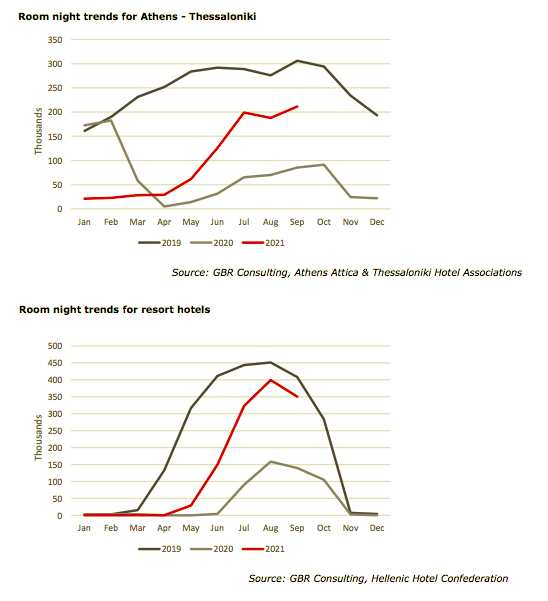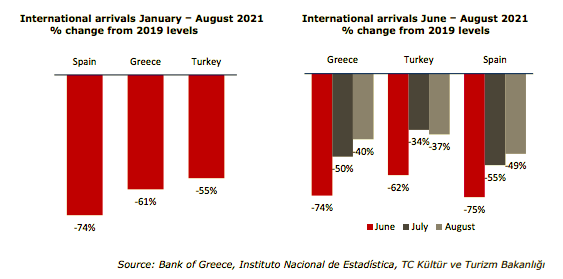According to GBR HOSPITALITY QUARTERLY NEWSLETTER report, data up to September unveil that the Athens and Thessaloniki hotel markets recovered to a level of 39% in terms of room nights compared to the same period of 2019. Room supply has been restored to pre-pandemic levels.
In August, Athens recorded a level of 71% of 2019 in terms of room nights, while September registered 66%. Contrary, Thessaloniki recorded 61% in August and 75% for September comparing room night levels between 2021 and 2019.

Relative insight versus competitors
Approximately 8.6 million international tourists travelled to Greece in the period of January – August 2021, a drop of 61% compared to the same period in 2019.
Competitor Spain registered 15.0 million international arrivals YTD August 2021 compared to 58.1million in 2019, a drop of 74%.
The rebound of the tourism sector in Turkey was stronger than Greece and Spain as the country recorded a drop of 55% in international arrivals during the reviewed period. Up to August 2021 Turkey received 14.1 million international arrivals, while same period in 2019 31.0 million tourists travelled to the country.
The recovery in Turkey was particularly strong in July. Each of the months of June, July and August the Turkish market outperformed the Greek and Spanish market. Greece performed better than Spain, especially during July and August.
International travel remains affected by a number of factors though.
Travel restrictions globally remain high despite vaccination progress. Restrictions are expected to be eased slowly and gradually. Some countries remain very risk averse which will delay the recovery process.
Vaccination progress differs per region and per country. High income countries and upper income countries show the highest vaccination rates, while low income countries clearly stay behind.
In Portugal and Spain 87% and 80% respectively of the population has been vaccinated making it safe countries to visit, while Greece has reached 61% so far. Also Turkey has stayed behind with 57%, while Balkan countries Romania and Bulgaria, which are important for the Greek tourism sector, only managed to vaccinate 31% and 21% respectively of their population as depicted in the graph below.
Furthermore, a reluctancy to international travel remains to avoid infections, masks, social distancing,tests and forms. High vaccination rates will reduce reluctancy further.
According to GBR Consulting it is expected that once travel bans are lifted, bookings will be rising.
















